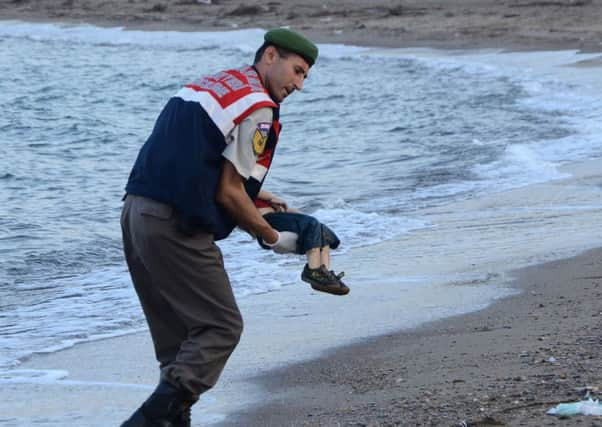Leaders: Aylan's image continues to haunt refugee crisis


It was a photograph that shocked the world, but sadly not into action. Last year’s picture of three-year-old Aylan Kurdi lying dead on a Turkish beach became one of the defining images of Syria’s unfolding humanitarian crisis.
But speaking on the anniversary of his son’s death, Abdullah Kurdi said the situation in his homeland had since worsened, with more people fleeing and more risking their lives at sea.
Advertisement
Hide AdAdvertisement
Hide AdMr Kurdi, who now lives in Iraq, also lost his wife and another son when their boat sank en route to the Greek island of Kos.
He said the world had been anxious to help following his son’s death, but efforts had stalled after only a month.
He appealed for countries to do more to help refugees and for Europe to keep its borders open.
Data released by Oxfam this week seems to confirm Mr Kurdi’s analysis.
According to the charity, the total number of refugees and migrants who have died while trying to reach another country has increased by more than a fifth in the last year – from 4664 deaths in the year before Aylan Kurdi’s death to 5700 since.
Most of those are deaths in the Mediterranean. It has been reported that in the last five days the Italian coastguard rescued 14,000 African migrants in the Strait of Sicily. Thirty separate rescue missions were needed to reach those who had attempted the hazardous crossing in small boats and rubber dinghies. Stopping economic migrants from Africa coming from countries in turmoil through those without effective governments is not really possible from the outside.
Last month, almost a year on from Aylan’s death, another image emerged from Syria’s civil war.
Five-year-old Omran Daqneesh was photographed bloodied and shellshocked in the back of an ambulance, covered in dust after a bomb struck his family’s building in Aleppo.
Advertisement
Hide AdAdvertisement
Hide AdOmran survived, but the picture of him with a haunting look of bewilderment on his face again caught the world’s attention before it shifted elsewhere once more.
That this is a humanitarian crisis is undeniable. But the humanitarian crisis is the consequence of a complex and intractable conflict.
For the exodus of refugees to stop, a political solution needs to be found to the war but any solution looks some way off. For now we must continue to recognise the lengths Syrians are going to flee their country. We have a moral imperative to take them in and integrate them the best we can.
Aylan Kurdi never made it to safety, but there are thousands more like him to whom we can offer sanctuary and we must do more to help. It is shameful that his father thinks nothing has changed.
Scotland has played its part and must continue to do so, Until a way can be found out of Syria’s political morass, it is the best we can do.
Forget the labels, focus on the needs
The psychological damage suffered by military personnel while in the service of their country is a complex and difficult subject. There have been many studies of what has euphemistically been called in the past shell shock or battle fatigue.
There have been many estimates as to how many men and women are affected by it in modern conflicts. There can be little doubt that there is still a stigma attached to mental health issues, and perhaps it is even more difficult for service personnel to get past that stigma, so the recording of mental illness is still unreliable.
It is unedifying in the extreme now to hear Ed Parker, co-founder and CEO of Walking With The Wounded, talking about the modern appellation of post traumatic stress disorder (PTSD) being exaggerated by veterans charities to help raise more money. The entire phenomenon is still little understood. The symptoms can sometimes come on years after the individual has left the service, but the symptoms can be utterly devastating and bring lives to ruin.
Advertisement
Hide AdAdvertisement
Hide AdIt is a well documented fact that there are disproportionate number of former service personnel among Britain’s homeless.
Mr Parker said PTSD was a small part of the problem and that more former servicemen and women suffered from alcohol problems and other mental health issues such as anxiety.
But that drink dependence and anxiety can be simply symptoms of psychological damage. It really makes no difference what label is applied to the problem, what matters is that there are people who need help, and they should be given help, and statements like Mr Parker’s do anything but.